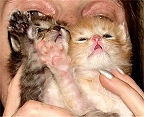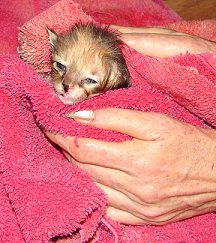First Aid Kit for Pet Owners: |
||
|
||
The following are questions that you should ask and things to check before calling the veterinarian:
Remember that a frightened or painful animal could bite or scratch. Be prepared with a cloth or with a large, thick blanket or towel to restrain a small animal. Have a family member or neighbor assist in transport. Trauma: Make sure kitten is breathing. Reduce any bleeding with direct pressure. Arterial bleeding (spurting blood) may require a tourniquet. (Tourniquets can be dangerous if left on too long; transport immediately.) Secure kitten in a blanket or towel if possible to reduce movement. Transport to hospital immediately. Choking: Be very careful when attempting to clear airway; kitten will often bite if panicked. The Heimlich Maneuver may work if an item is lodged in windpipe. (Note: coughing and gagging are often confused with choking--a kitten which is truly choking will move little or no air at all, and his gum color will be gray or bluish. A kitten who experiences periodic episodes of "choking" may be gagging.) Transport to hospital immediately. Respiratory Distress: If kitten is gasping or breathing heavily, remove collars/leads and use minimal restraint during transport. Stay calm--kittens can sense and react to our stress. Transport to hospital immediately. Seizure: Make sure that kitten cannot hurt himself. DO NOT attempt to place anything in his mouth. If poisons such as snail bait have been used recently, bring box with you to the veterinarian. Bundle kitten in a blanket--get help to transport kitten in case seizures occur. Transport to hospital immediately. Straining to Urinate: Inability to urinate is life-threatening. There is no home aid. Transport to hospital immediately. Diabetic Insulin Crisis: Hypoglycemia (low blood sugar) can be characterized by weakness, disorientation, seizures. Place Karo Syrup® on gums and transport to hospital immediately. Nonproductive Vomiting or Retching: This is the most common sign of a life-threatening condition called "gastric dilitation and volvulus", or "torsion." There is no home aid. Transport to hospital immediately. Bleeding (Hemorrhaging): For bleeding wounds, apply direct pressure with a thick cloth. If blood soaks through, apply additional cloths (do not remove original dressing). If blood is spurting from wound (arterial bleeding), apply tourniquet above wound. (Tourniquets are only practical on limbs, and can be dangerous if left on long, so transport immediately.) If kitten is bleeding from rectum, mouth or other orifice, no home aid is recommended. In all cases, transport to hospital immediately. Heatstroke: Heatstroke is characterized by acute collapse, often following heavy activity in hot weather or confinement in a hot space such as a car. The kitten will pant heavily, and mucous membranes may be brick red. Give a cold water bath or drench with a hose and transport to hospital immediately.
|


Baby Kitten Home New Baby Kitten Baby Kitten Handling Baby Kitten Basics Kitten Diseases Kitten's Future Kitten Articles Kitten Corner Resources:
|
|
|||
|
|
Finding the right Kitten - Kitten or Cat? - Adopt a Cat for Life - Kitten Development - Kitten Age - Kitten Formula Recipe - Kitten Diet - Kitten Tips - Potty the Kitten - Kitten Hydration - Rehydrate the Kitten - Conjunctivitis - Runny Eyes - Eye Infections - Eye Discharge - Third Eyelid - Feline Infectious Diseases - (FIV) - (FeLV) - (FIP) - Feline Aids - Feline Leukemia - Rabies Vaccine - Feline Herpes Virus - Feline Distemper - Kitten Health Dangers - Kitten Ilnesses - Kitten Diseases - Preventative Care - Spaying and Neutering - Fixing - How to play with your Kitten - Kitten Toys - Kitten Bonding - Coccidial Infections (Coccidia) - Giardia - Cryptosporidium - Toxoplasmosis - Roundworms - Hookworms - Tapeworms - Pinworms - Whipworms - Fleas - Ticks - Ear mites - Injuries - Sneezing - Poisonous Plants - Cute Kitten Videos |
|
Webdesign and Photos by SmilingPages.com in Support of the Rainbow Wildlife Rescue - Privacy Policy |
